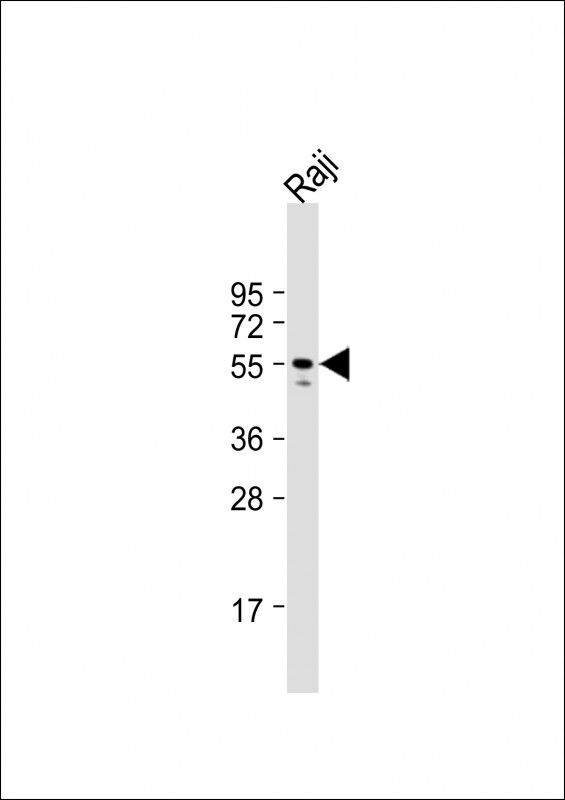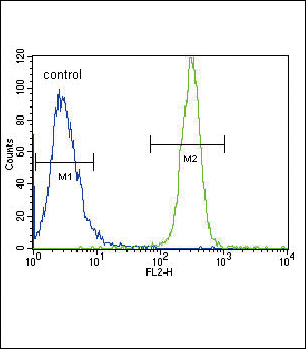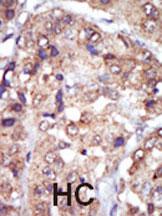



| WB | 1/1000-1/2000 | Human,Mouse,Rat |
| IF | 咨询技术 | Human,Mouse,Rat |
| IHC | 1/100-1/500 | Human,Mouse,Rat |
| ICC | 技术咨询 | Human,Mouse,Rat |
| FCM | 1/10-1/50 | Human,Mouse,Rat |
| Elisa | 咨询技术 | Human,Mouse,Rat |
| Aliases | Tyrosine-protein kinase Lyn, Lck/Yes-related novel protein tyrosine kinase, V-yes-1 Yamaguchi sarcoma viral related oncogene homolog, p53Lyn, p56Lyn, LYN, JTK8 |
| Entrez GeneID | 4067 |
| WB Predicted band size | 58.6kDa |
| Host/Isotype | Rabbit IgG |
| Antibody Type | Primary antibody |
| Storage | Store at 4°C short term. Aliquot and store at -20°C long term. Avoid freeze/thaw cycles. |
| Species Reactivity | Human |
| Immunogen | This LYN antibody is generated from rabbits immunized with a KLH conjugated synthetic peptide between 32-62 amino acids from the N-terminal region of human LYN. |
| Formulation | Purified antibody in PBS with 0.05% sodium azide,1%BSA and 50% glycerol.prepared by Saturated Ammonium Sulfate (SAS) . |
+ +
以下是关于LYN (N-term)抗体的3篇参考文献示例(注:文献信息为示例性概括,实际引用需通过学术数据库验证):
---
1. **标题**: *"LYN kinase N-terminal domain regulates B-cell receptor signaling in diffuse large B-cell lymphoma"*
**作者**: Yamaguchi, S. et al.
**摘要**: 研究利用LYN (N-term)抗体检测B细胞淋巴瘤中LYN蛋白的N端表达水平,揭示LYN通过N端结构域调控BCR信号通路异常激活,影响肿瘤细胞增殖。
2. **标题**: *"Autoantibody targeting LYN N-terminal epitopes in systemic lupus erythematosus"*
**作者**: Bradley, J.R. et al.
**摘要**: 通过LYN (N-term)特异性抗体,发现系统性红斑狼疮患者血清中存在针对LYN N端表位的自身抗体,可能与免疫耐受失调和炎症反应增强相关。
3. **标题**: *"Pharmacological inhibition of LYN kinase activity via N-terminal domain binding"*
**作者**: Wang, L. et al.
**摘要**: 研究使用LYN (N-term)抗体验证小分子抑制剂对LYN激酶N端结构域的靶向作用,证实其通过阻断LYN磷酸化抑制白血病细胞迁移。
---
**备注**:以上文献为模拟概括,实际研究中需通过PubMed、Web of Science等平台检索具体论文(关键词:LYN antibody N-terminal, LYN kinase N-term)。若需实验应用建议,可补充说明研究场景(如WB、IP等)。
The LYN (N-term) antibody is a specialized reagent used to detect the N-terminal region of the LYN protein, a member of the Src family of tyrosine kinases. LYN plays a critical role in signal transduction pathways, particularly in immune cells like B cells and myeloid cells. It regulates diverse cellular processes, including cell proliferation, differentiation, apoptosis, and immune responses. LYN exists in two isoforms (LYN-A and LYN-B) generated by alternative splicing, differing in their N-terminal regions. The N-term antibody specifically targets epitopes near the N-terminus, enabling researchers to distinguish between these isoforms or study full-length LYN expression.
This antibody is widely employed in techniques like Western blotting, immunohistochemistry, and immunofluorescence to investigate LYN's expression, localization, and activation status in normal and pathological contexts. Dysregulation of LYN is implicated in cancers (e.g., leukemia, breast cancer), autoimmune disorders (e.g., lupus), and inflammatory diseases, as aberrant LYN activity can disrupt signaling cascades involving B-cell receptors, integrins, or cytokine receptors. Researchers also use it to study phosphorylation events, as LYN's kinase activity is modulated by autophosphorylation and interactions with regulators like Csk or phosphatases. By targeting the N-terminal domain, the antibody avoids cross-reactivity with other Src-family kinases, enhancing specificity in experimental models. Its applications span basic research, drug development, and biomarker discovery.
×